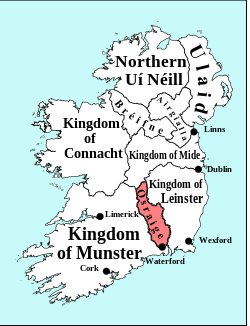King of Ossory
| Ossory | ||||||||||||||
| (in Irish) Osraige or Osraighe | ||||||||||||||
|
||||||||||||||
|
Ireland c. 900
|
||||||||||||||
| Capital | Kilkenny | |||||||||||||
| Languages | Old Irish, Middle Irish, Latin | |||||||||||||
| Religion |
Celtic polytheism (pre-432), Celtic Christianity (c. 432–1152), Roman Catholicism (c. 1152–present) |
|||||||||||||
| Government | Monarchy | |||||||||||||
| First and last Kings | ||||||||||||||
| • | (eponymous founder) c. 150 AD | Óengus Osrithe | ||||||||||||
| • | (last king of major Osraige) d. 1194 | Maelseachlainn Mac Gilla Patráic | ||||||||||||
| • | submitted 1537; ennobled 1541 | Brian Mac Giolla Phádraig | ||||||||||||
| History | ||||||||||||||
| • | Osraige | c. 150 AD | ||||||||||||
| • | Disestablished | 1541 AD | ||||||||||||
|
||||||||||||||
| Today part of |
|
|||||||||||||
| Dál Birn / Mac Giolla Phádraig | |
|---|---|
| Country | Ireland |
| Parent house | Ulaid / Érainn |
| Titles |
Kingdom of Ireland titles: |
Osraige, also known as Osraighe or Ossory (modern Irish: Osraí), was a medieval Irish kingdom comprising most of present-day County Kilkenny and western County Laois. The home of the Osraige people, it existed from around the first century until the Norman invasion of Ireland in the 12th century. It was ruled by the Dál Birn dynasts, whose medieval descendants assumed the surname Mac Giolla Phádraig. The name survives in the Catholic Diocese of Ossory, established in the 5th century, which continues to use roughly the same borders.
According to tradition, Osraige was founded by Óengus Osrithe in the 1st century and was originally within Leinster's polity. In the 5th century, the Corcu Loígde of Munster displaced the Dál Birn and brought Osraige under Munster's direct control. The Dál Birn returned to power in the 7th century, though Osraige remained nominally part of Munster until 859, when it achieved formal independence under the powerful king Cerball mac Dúnlainge. Osraige's rulers remained major players in Irish politics for the next three centuries, though they never vied for the High Kingship. In the early 12th century, dynastic infighting fragmented the kingdom, and it was re-adjoined to Leinster. The Normans under Strongbow invaded Ireland beginning in 1169, and most of Osraige collapsed under pressure from Norman leader William Marshal. The northern part of the kingdom, eventually known as Upper Ossory, survived intact under the hereditary lordship until the reign of King Henry VIII of England, when it was formally incorporated as a barony of the same name.
...
Wikipedia

